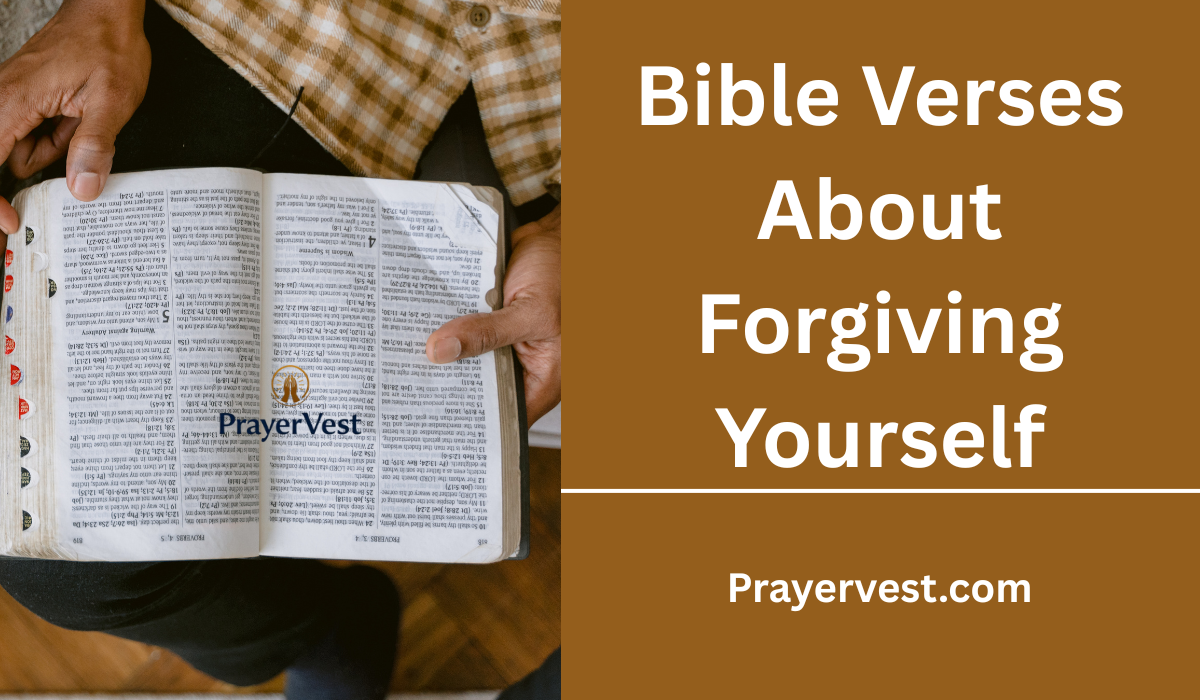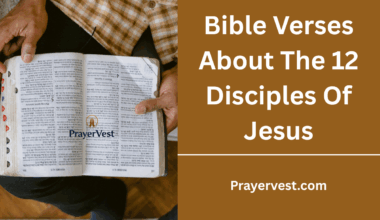Bible Verses About Forgiving Yourself. One of the most difficult phases in the process of healing and spiritual development is frequently forgiving oneself. Even while the Bible makes repeated references to God’s forgiveness of us and our obligation to forgive others, many Christians find it difficult to let go of their regrets, guilt, and shame.
We may be unable to completely experience the freedom that comes through Christ if we are burdened by our past transgressions. Scripture’s veracity serves as a reminder that God’s mercy surpasses our shortcomings and that we are obligated to accept His pardon and live in grace.
A common cause of self-forgiveness is clinging to an ideal of perfection that only God can achieve. Even though the Bible states that “there is now no condemnation for those who are in Christ Jesus,” we allow condemnation to spread when we concentrate on our flaws rather than God’s mercy (Romans 8:1).
Believing that Jesus’ blood is enough to cleanse and repair is what it means to forgive yourself, not to reject sin. We can break free from the bonds of self-blame because His Word serves as a reminder that God freely extends forgiveness, which is not something we have to earn.


Examining Bible passages about self-forgiveness enables us to understand that accepting God’s grace and learning to live in His love are the first steps toward recovery. For people who are struggling with regret or remorse, these scriptures provide guidance, hope, and support. They serve as a reminder that God enjoys extending mercy, that we are new creations in Christ, and that He is fully forgiving. We can proceed with serenity, self-assurance, and spiritual rejuvenation as we reflect on these verses because we learn to show ourselves the same care that God so kindly gives to us.
40 Comforting Bible Verses About Forgiving Yourself (2026)
1. Psalm 32:5
“Then I acknowledged my sin to you and did not cover up my iniquity. I said, ‘I will confess my transgressions to the Lord.’ And you forgave the guilt of my sin.”
David shows the freedom that comes from confession and God’s forgiveness. Once he released the weight of guilt and acknowledged his sins before the Lord, he was met with mercy. This verse teaches that self-forgiveness begins with accepting God’s forgiveness, which breaks the chains of shame and restores peace to the soul.
2. Psalm 51:10
“Create in me a pure heart, O God, and renew a steadfast spirit within me.”
In his plea after deep moral failure, David prays for inner cleansing and renewal. Rather than being stuck in guilt, he seeks transformation and restoration. This verse highlights that forgiving yourself requires allowing God to cleanse your heart and give you the strength to move forward with a renewed spirit.
3. Psalm 103:12
“As far as the east is from the west, so far has he removed our transgressions from us.”
This beautiful promise emphasizes the completeness of God’s forgiveness. When God removes our sins, they are gone forever—beyond retrieval. The verse encourages us to let go of guilt and self-condemnation, remembering that God does not hold our forgiven sins against us, and neither should we.
4. Psalm 130:3-4
“If you, Lord, kept a record of sins, Lord, who could stand? But with you there is forgiveness, so that we can, with reverence, serve you.”
This psalm acknowledges that no one could stand before God if He kept track of every sin. Yet, His forgiveness makes room for restoration and renewed worship. The verse reminds us that holding on to self-condemnation is unnecessary because God’s mercy enables us to live freely in His presence.
5. Psalm 147:3
“He heals the brokenhearted and binds up their wounds.”
God’s forgiveness not only removes guilt but also brings healing to the broken places in our hearts. For those struggling with regret or shame, this verse assures that God cares deeply and restores us completely. It teaches that forgiving yourself is part of allowing God’s healing to mend the wounds of the past.
7. Psalm 34:18
“The Lord is close to the brokenhearted and saves those who are crushed in spirit.”
This verse shows God’s tender care for those weighed down by guilt, shame, or self-condemnation. When we feel crushed by our failures, He draws near with love and healing. It teaches us that we do not have to punish ourselves endlessly—God’s presence restores and uplifts us when we learn to forgive ourselves.
8. Psalm 40:2
“He lifted me out of the slimy pit, out of the mud and mire; he set my feet on a rock and gave me a firm place to stand.”
David describes how God rescued him from a place of despair and gave him stability. Self-forgiveness is often about allowing God to lift us from the pit of guilt and place us on the solid ground of His grace. This verse reminds us that God doesn’t just forgive—He restores our footing and sets us on a path of hope.
9. Psalm 86:5
“You, Lord, are forgiving and good, abounding in love to all who call to you.”
This verse highlights God’s character as overflowing with forgiveness and love. When we call on Him sincerely, He responds with mercy. If God Himself is abounding in forgiveness, then holding ourselves hostage to guilt is unnecessary. We are invited to embrace His goodness and release self-condemnation.
10. Psalm 119:50
“My comfort in my suffering is this: Your promise preserves my life.”
The psalmist finds hope in God’s promises even in times of deep struggle. When guilt or regret weighs us down, His Word reminds us that forgiveness and restoration are already secured. This verse assures us that God’s promises preserve us, giving us the strength to forgive ourselves and move forward in faith.
11. Psalm 19:12
“But who can discern their own errors? Forgive my hidden faults.”
The psalmist admits that sometimes we are blind to our own mistakes and sins. This verse highlights God’s grace in forgiving even the faults we don’t recognize. It encourages us not to dwell in shame over every imperfection but to trust God’s mercy and extend forgiveness to ourselves as He does.
12. Psalm 25:11
“For the sake of your name, Lord, forgive my iniquity, though it is great.”
Here, David appeals to God’s character rather than his own worthiness. Even in the face of great sin, God’s forgiveness is greater. This verse reminds us that self-forgiveness is possible because God’s mercy does not depend on the size of our mistakes but on the greatness of His love.
13. Psalm 31:24
“Be strong and take heart, all you who hope in the Lord.”
When guilt weakens our spirit, this verse provides strength and encouragement. Hope in the Lord brings the courage to let go of past mistakes and walk in freedom. It teaches us that forgiving ourselves requires leaning on God’s strength, not our own.
14. Psalm 38:22
“Come quickly to help me, my Lord and my Savior.”
The psalmist cries out for urgent rescue from the heavy burden of sin. This verse reflects the reality of how guilt can feel overwhelming, yet it also shows God’s readiness to save. When we struggle to forgive ourselves, we can call on Him for immediate help and healing.
15. Psalm 51:17
“My sacrifice, O God, is a broken spirit; a broken and contrite heart you, God, will not despise.”
God values humility and repentance more than outward rituals. This verse reminds us that He receives us when we come with genuine remorse, not perfection. Self-forgiveness begins with recognizing that God has already accepted our brokenness and offers restoration.
16. Psalm 65:3
“When we were overwhelmed by sins, you forgave our transgressions.”
The psalmist acknowledges the suffocating weight of sin but rejoices in God’s forgiveness. This verse teaches us that no matter how overwhelming guilt may feel, God’s mercy is stronger. If He forgives us fully, we are free to release ourselves from guilt as well.
17. Psalm 71:20
“Though you have made me see troubles, many and bitter, you will restore my life again; from the depths of the earth you will again bring me up.”
This verse emphasizes God’s power to restore even after deep suffering. Self-forgiveness is often tied to believing that God can bring us back from shame and regret. His restoration lifts us from our lowest points into renewed life.
18. Psalm 85:2
“You forgave the iniquity of your people and covered all their sins.”
This verse celebrates God’s complete forgiveness, which covers sins entirely. It is a reminder that once God has forgiven, there is no need for us to uncover old guilt. We can forgive ourselves because He has already wiped our record clean.
19. Psalm 86:15
“But you, Lord, are a compassionate and gracious God, slow to anger, abounding in love and faithfulness.”
This verse points to God’s gentle nature toward His people. When we condemn ourselves harshly, we should remember that God is not quick to anger but rich in love. Learning to forgive ourselves mirrors the compassion and grace God extends to us.
20. Psalm 94:19
“When anxiety was great within me, your consolation brought me joy.”
The psalmist describes how God’s comfort replaces inner turmoil with joy. Self-condemnation often leads to deep anxiety, but God’s forgiveness restores peace. This verse teaches that embracing His consolation allows us to forgive ourselves and experience freedom in His joy.
21. Psalm 103:3
“Who forgives all your sins and heals all your diseases.”
This verse shows God’s complete care—He not only forgives sins but also brings healing. Forgiving yourself often goes hand-in-hand with emotional and spiritual healing. God’s wholeness means we are fully restored, not partially forgiven.
22. Psalm 103:10
“He does not treat us as our sins deserve or repay us according to our iniquities.”
God does not repay us with judgment equal to our failures. Instead, He gives grace. This verse reminds us that if God does not condemn us according to our mistakes, we should not condemn ourselves either. Self-forgiveness is part of living in His grace.
23. Psalm 116:5
“The Lord is gracious and righteous; our God is full of compassion.”
The psalmist praises God’s compassion and mercy. This verse highlights His kindness toward us, even when we fall short. Remembering His grace helps us let go of harsh self-criticism and embrace self-forgiveness rooted in His love.
24. Psalm 118:5
“When hard pressed, I cried to the Lord; he brought me into a spacious place.”
Here the psalmist recalls God’s deliverance from a place of pressure and distress. Guilt and shame can feel suffocating, but God brings us into a “spacious place” of freedom. This verse encourages us to let His deliverance free us from self-condemnation.
25. Psalm 119:76
“May your unfailing love be my comfort, according to your promise to your servant.”
God’s love is a constant source of comfort, even when we are burdened by regret. This verse reminds us that His promises are unshakable, providing assurance that we can forgive ourselves because His mercy holds us.
26. Psalm 119:132
“Turn to me and have mercy on me, as you always do to those who love your name.”
The psalmist seeks mercy from a faithful God who always extends compassion. When we struggle to forgive ourselves, this verse reassures us that His mercy never fails and is available to us continually.
27. Psalm 121:7
“The Lord will keep you from all harm—he will watch over your life.”
Even when past mistakes haunt us, this verse promises God’s protective care. His watchful presence keeps us safe, reminding us that we no longer need to live under fear or self-condemnation. Forgiving ourselves aligns with trusting His protection.
28. Psalm 126:5
“Those who sow with tears will reap with songs of joy.”
This verse offers hope that sorrow over sin and regret is not the end of the story. God turns tears into joy. When we forgive ourselves, we open the door to rejoice in His restoration and future blessings.
29. Psalm 139:23–24
“Search me, God, and know my heart; test me and know my anxious thoughts. See if there is any offensive way in me, and lead me in the way everlasting.”
The psalmist invites God to examine his heart fully. This openness reflects a willingness to release guilt and follow God’s guidance. Forgiving yourself begins with trusting God’s searchlight of mercy to lead you into peace and new life.
30. Psalm 145:8
“The Lord is gracious and compassionate, slow to anger and rich in love.”
This verse highlights God’s nature as patient and loving. While we may be quick to condemn ourselves, God is slow to anger. Embracing His patience helps us extend grace inwardly and practice self-forgiveness with gentleness.
31. Psalm 25:6
“Remember, Lord, your great mercy and love, for they are from of old.”
The psalmist appeals to God’s long history of mercy and compassion. This verse assures us that His forgiveness is not new—it has always been His nature. Because of this, we can let go of guilt and forgive ourselves, knowing His mercy is eternal.
32. Psalm 30:5
“For his anger lasts only a moment, but his favor lasts a lifetime; weeping may stay for the night, but rejoicing comes in the morning.”
This verse paints a picture of God’s mercy overcoming His anger. Guilt may bring us nights of sorrow, but His forgiveness ensures joy in the morning. Self-forgiveness allows us to embrace His favor and move forward with hope.
33. Psalm 37:23–24
“The Lord makes firm the steps of the one who delights in him; though he may stumble, he will not fall, for the Lord upholds him with his hand.”
Even when we stumble, God does not abandon us. This verse reminds us that falling is not the end—He lifts us up. Learning to forgive ourselves mirrors God’s grace, allowing us to stand again after failure.
34. Psalm 55:22
“Cast your cares on the Lord and he will sustain you; he will never let the righteous be shaken.”
The psalmist encourages us to place every burden—including guilt—into God’s hands. This verse shows that God sustains us when we feel weighed down. Forgiving ourselves is part of releasing those heavy cares to Him.
35. Psalm 71:1
“In you, Lord, I have taken refuge; let me never be put to shame.”
Shame often lingers when we cannot forgive ourselves, but God provides a safe refuge. This verse reminds us that He removes shame and covers us with His protection, allowing us to live free from self-condemnation.
36. Psalm 86:13
“For great is your love toward me; you have delivered me from the depths, from the realm of the dead.”
The psalmist celebrates God’s deliverance from despair and death itself. This verse assures us that no matter how deep our regret, His love can rescue us. Forgiving ourselves means embracing His deliverance fully.
37. Psalm 119:114
“You are my refuge and my shield; I have put my hope in your word.”
God’s Word gives us hope and protection against guilt’s accusations. This verse teaches us that we can forgive ourselves by standing on His promises rather than our failures. His Word is our shield against self-condemnation.
38. Psalm 145:14
“The Lord upholds all who fall and lifts up all who are bowed down.”
This verse shows God’s compassion for those weighed down by sin or regret. He lifts us when we fall, restoring our dignity. Self-forgiveness is simply agreeing with God that we are worthy of being lifted up again.
39. Psalm 147:11
“The Lord delights in those who fear him, who put their hope in his unfailing love.”
God’s delight is not in our perfection but in our trust in His love. This verse reassures us that our value is found in His mercy, not in our flawless performance. Forgiving ourselves allows us to live in the joy of His delight.
40. Psalm 149:4
“For the Lord takes delight in his people; he crowns the humble with victory.”
This closing verse celebrates God’s joy over His people. Humility opens the door to His victory, even after failure. When we forgive ourselves, we walk in the victory He has already given, crowned by His grace.
Conclusion
In summary, the Bible reminds us that self-forgiveness involves entirely relying on God’s already granted forgiveness, not ignoring one’s transgressions. Embracing His kindness enables us to walk in freedom and serenity, whereas clinging to guilt simply makes us feel heavier. We are freed from judgment and enter a life of renewed hope and purpose when we embrace the assurance found in God’s Word that His grace is bigger than our sins.
In the end, choosing to trust that what God says about ourselves is true is what self-forgiveness is all about. He refers to us as loving, redeemed, and cleansed. We can let go of regret and humiliation by accepting His promises because we know that He is fully forgiving us. We can live out the fullness of the Lord’s grace every day as we forgive ourselves, creating space for healing, joy, and a closer relationship with Him.






